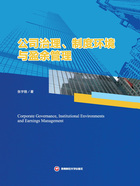
1.2 The determinants of corporate earnings management
1.2.1 Accounting standards
Dechow et al.(2010)argue that reported earnings are determined both by fundamental performance and measurement of this performance, of which the latter is considerably affected by accounting standards. In other words, accounting standards will determine the degree of managerial discretion regarding revenue and loss recognition, and thereby, affect the level of corporate earnings management. In general,accounting regulators(e.g.,IASB)attempt to increase the compatibility and value relevance of earnings information by developing an internationally acceptable set of financial reporting standards(Barth et al., 2008). International Financial Reporting Standards(IFRS), which has been adopted by numerous countries during the past two decades, is typical of such accounting standards. The introduction of IFRS offers researchers an appropriate opportunity to investigate whether accounting standards affect the degree of earnings management; it also raises the question of whether IFRS improves earnings quality uniformly around the world. Barth et al.(2008),Barth et al.(2012),Liu et al.(2011)and Cormier et al.(2009)suggest earnings quality increases with the adoption of IFRS. In contrast, He et al.(2012), Rudra and Bhattacharjee(2012)and Callao et al.(2007)find that earnings management increases after the introduction of IFRS in China,India and Spain.
1.2.2 Corporate governance devices
Corporate governance is a“set of mechanisms that induces the self-interested controllers of a company(those that make decisions regarding how the company will be operated)to make decisions that maximize the value of the company to its owners(the suppliers of capital)”(Denis and McConnell, 2003). Well-designed corporate governance structures can reduce inefficiencies arising from insiders′ moral hazards and adverse selection, and thereby, are an effective way to mitigate expropriation problems and earnings management(Shleifer and Vishny, 1997; La Porta et al., 2000a; Klapper and Love, 2004; Gillan, 2006; Liu and Lu, 2007). Numerous studies have also investigated the relationship between corporate governance and earnings management. Early studies focus on a single country(typically the U. S. or other OECD countries)and generally find a negative impact of the efficiency of firmlevel governance devices on earnings management. For example, independent boards make it difficult for insiders to expropriate minority shareholders′wealth and to manage earnings(Klein,2002; Liu and Liu,2007; Lo et al.,2010; Xie et al.,2003). Due to the high costs of the destruction of reputation, professional, internationally reputable auditors can effectively mitigate the intentional and unintentional misstatement of client firms in the reporting process(Krishnan, 2003a, 2003b;Iatridis,2012).
1.2.3 Legal protection
A notable survey by Dechow et al.(2010)suggests that recent literature pays increasing attention to cross-country variation in earnings management and its relation to country-level legal systems.These studies generally document a negative association between country-level investor protection and earnings management(Leuz et al., 2003;Haw et al., 2004; Shen and Chih, 2005; Burgstahler et al., 2006; Lang et al., 2006). A developed legal system imposes a high risk of future litigation and significant costs of damaged reputation on corporate insiders who extract private benefits(La Porta et al.,1998;Claessens et al.,2002;Dyck and Zingales,2004). As a result,strong legal systems can effectively prevent controlling shareholders from extracting private benefits(La Porta et al., 1998; Nenova, 2003; Claessens et al., 2002;Dyck and Zingales, 2004). With such, controlling shareholders have a weak incentive to manage reported earnings in those countries.
In addition to investor protection, legal protection of intellectual property rights also affects the level of earnings management. Firms with profitable technologies tend to adopt accounting opacity(low transparent accounting information)to prevent technology spillovers to potential competitors(Fan and Wong, 2002; Fan et al., 2013). This is especially true for firms located in regions with weak legal protection of intellectual property rights. Consistent with this idea, Fan et al.(2013)show evidence that income smoothing of Chinese firms is negatively related to provincial legal protection of intellectual property rights.